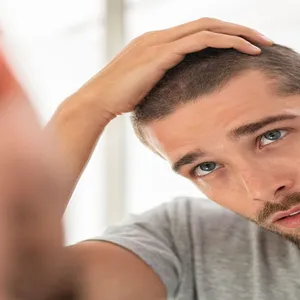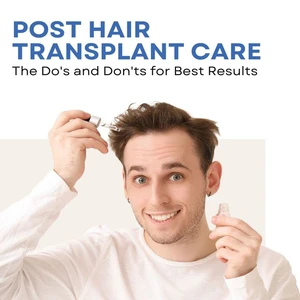Hair Transplant Myths vs. Facts: Separating Truth from Fiction

Hair transplant procedures have gained immense popularity in recent years, offering a long-lasting solution to hair loss. However, alongside this rise in interest comes a flood of myths and misconceptions. These myths can create unnecessary fear and confusion for individuals considering the procedure. In this blog, we’ll separate fact from fiction, debunking some of the most common hair transplant myths to help you make an informed decision. Myth 1: Hair Transplants Are Only for Men Fact: Hair transplants are not exclusive to men. While male pattern baldness is a common reason for the procedure, women experiencing hair thinning, receding hairlines, or bald spots can also benefit from hair transplants. The treatment is personalized to suit the specific hair restoration needs of each individual, regardless of gender. Myth 2: Hair Transplants Produce Unnatural Results Fact: Thanks to advancements in hair transplant techniques, such as Follicular Unit Transplantation (FUT) and Follicular Unit Extraction (FUE), modern hair transplants produce highly natural-looking results. Skilled surgeons meticulously place the grafts to match the natural hairline and growth pattern, ensuring seamless integration with your existing hair. Myth 3: The Procedure Is Painful Fact: Hair transplants are performed under local anesthesia, making the procedure virtually painless. While some discomfort may be experienced during the healing process, it is typically mild and manageable with prescribed medications. Patients often compare the sensation to a mild sunburn rather than intense pain. Myth 4: Hair Transplants Are a Quick Fix Fact: Hair transplants are not an instant solution. The process requires time and patience. Transplanted hair may shed within the first few weeks as part of the natural growth cycle. New hair growth typically begins within 3–4 months, with full results visible after 12–18 months. Myth 5: Hair Transplants Are Only for Older People Fact: Age is not a deciding factor for hair transplant eligibility. The suitability of the procedure depends on the individual’s hair loss pattern, donor area quality, and overall health. Many younger individuals opt for hair transplants to address early signs of hair loss and restore their confidence. Myth 6: Transplanted Hair Requires Special Maintenance Fact: Transplanted hair is your natural hair, and once it has fully grown, it does not require any special maintenance. You can treat it just like the rest of your hair—wash, cut, and style it as you normally would. Myth 7: Hair Transplants Can Stop Future Hair Loss Fact: While a hair transplant can restore lost hair in specific areas, it does not stop ongoing hair loss in non-transplanted areas. Many patients choose to combine the procedure with medications like Minoxidil or Finasteride to slow down or prevent further hair loss. Myth 8: The Results Are Temporary Fact: Hair transplants provide a permanent solution because the transplanted hair follicles are taken from the donor area, typically the back of the scalp, which is genetically resistant to hair loss. Once transplanted, these follicles continue to grow naturally for a lifetime. Myth 9: Hair Transplants Leave Visible Scars Fact: Modern hair transplant techniques, such as FUE, minimize scarring. In FUE, individual follicles are extracted, leaving tiny, barely visible dots that heal over time. Even in FUT, where a strip of scalp is removed, skilled surgeons ensure the scar is discreet and hidden under existing hair. Myth 10: Hair Transplants Are Too Expensive Fact: While hair transplants are an investment, the cost varies based on the extent of hair loss, the number of grafts needed, and the clinic’s expertise. Compared to the lifetime costs of temporary solutions like wigs, hairpieces, or continuous medication, hair transplants offer excellent value for a permanent solution. Why Choose Keva Hair Care for Your Hair Transplant? At Keva Hair Care in Coimbatore, we prioritize patient education and transparency. Our experienced team provides personalized consultations to address your concerns and debunk myths, ensuring you feel confident in your decision. With advanced techniques and state-of-the-art facilities, we deliver natural-looking, long-lasting results. Conclusion Hair transplants are a safe, effective, and permanent solution for hair loss when performed by skilled professionals. By separating myths from facts, you can make an informed decision about your hair restoration journey. Trust Keva Hair Care to guide you every step of the way. Contact Us Today! Address: No 424K, 3rd Floor, Harmony Complex, Diwan Bahadur Rd, above ICICI Bank, above Pandiyan Medicals, R.S. Puram, Coimbatore, Tamil Nadu 641002. Phone: +91 95855 25905 Website: https://kevahaircare.com Frequently Asked Questions What is the success rate of hair transplants at Keva Hair Care? Our hair transplant procedures have a high success rate, thanks to our skilled surgeons and advanced techniques. We aim to provide natural and long-lasting results. How long does it take to recover from a hair transplant? Recovery typically takes 7–10 days, but most patients can resume regular activities within a few days. We provide comprehensive post-care instructions to ensure smooth healing. Is a hair transplant permanent? Yes, hair transplants provide permanent results as the transplanted hair follicles are resistant to hair loss. However, maintaining healthy hair requires proper care. Are there any side effects of hair transplant procedures? Minor side effects such as swelling or redness may occur but subside within a few days. Our team ensures the procedure is safe and minimally invasive. How do I book a consultation at Keva Hair Care? You can book a consultation by calling us at +91 95855 25905 or visiting our website at https://kevahaircare.com. blog Related articles
Caring for Transplanted Hair: Detailed Advice for Recovery and Optimizing Growth

A hair transplant is a life-changing procedure that can restore not just your hair but also your confidence. However, the journey to achieving optimal results doesn’t end with the surgery. Proper care, patience, and a commitment to following recovery guidelines are essential to ensure the health of your transplanted hair and scalp. In this blog, we’ll provide detailed advice on how to care for your transplanted hair, manage the recovery process, and optimize hair growth for long-term success. Immediate Post-Transplant Care The first few days after your hair transplant are critical for the healing process. Here’s what you need to do: 1. Follow Your Surgeon’s Instructions Your surgeon will provide personalized aftercare guidelines. These instructions are tailored to your specific case and are crucial for avoiding complications and ensuring the best outcomes. 2. Protect the Grafts Avoid touching, scratching, or rubbing the transplanted area. Wear loose-fitting caps or hats if you need to protect your scalp from dust or sunlight. 3. Sleep Carefully Keep your head elevated using pillows or a recliner to minimize swelling. Avoid sleeping on your stomach to prevent pressure on the grafts. 4. Manage Swelling Swelling around the forehead or eyes is common after a transplant. Ice packs or prescribed medications can help alleviate discomfort. Washing and Cleaning 1. Wait Before Washing Do not wash your hair for at least 48–72 hours post-surgery, or as advised by your surgeon. 2. Use Gentle Products Use a mild, sulfate-free shampoo recommended by your clinic. Wash your hair gently using lukewarm water. 3. Pat Dry Avoid using a towel to rub your scalp. Instead, pat it dry with a soft, clean cloth. Activity Restrictions 1. Avoid Strenuous Activities Refrain from exercise, heavy lifting, or activities that cause sweating for at least two weeks. Avoid bending or lowering your head to reduce pressure on the scalp. 2. Protect from Sunlight Keep your scalp covered when outdoors to avoid direct exposure to sunlight. Use a hat or umbrella for protection, especially during the first month. 3. Avoid Smoking and Alcohol Both smoking and alcohol can hinder blood flow to the scalp, slowing down healing and hair growth. Avoid these for at least a month post-transplant. Managing Recovery 1. Understand the Shedding Phase It’s normal for transplanted hair to shed within the first few weeks. This process, known as “shock loss,” makes way for new growth and is a natural part of the cycle. 2. Manage Itching and Discomfort Use prescribed medications to alleviate itching. Avoid scratching, as it can dislodge grafts. 3. Look for Signs of Infection Watch for redness, swelling, or discharge in the transplant area. If you notice these symptoms, contact your surgeon immediately. Optimizing Hair Growth 1. Maintain a Healthy Diet A balanced diet rich in essential nutrients supports hair health and growth. Include: Proteins: Eggs, fish, and lean meat. Vitamins: Vitamin A, B7 (biotin), C, and E. Minerals: Iron, zinc, and magnesium. 2. Stay Hydrated Drinking enough water promotes healthy circulation and ensures nutrients reach your hair follicles. 3. Use Medications or Topical Treatments Minoxidil or finasteride may be recommended to enhance growth and reduce future hair loss. Always follow your surgeon’s advice when using these products. 4. Massage Your Scalp Once your scalp has healed, gentle massages can improve blood flow and stimulate hair follicles. 5. Avoid Harsh Hair Treatments Skip chemical treatments like coloring or straightening for at least six months. Limit the use of heat styling tools. Long-Term Care for Transplanted Hair Stick to a hair care routine with mild shampoos and nourishing conditioners. Schedule regular follow-ups with your surgeon to monitor progress and address concerns. Adopt stress-relief practices like meditation or yoga to prevent stress-induced hair loss. Why Choose Keva Hair Care for Your Hair Transplant Journey? At Keva Hair Care in Coimbatore, we offer world-class hair transplant services combined with personalized aftercare. Our team of experts ensures that you receive comprehensive guidance at every step of your hair restoration journey, from consultation to post-surgery follow-ups. Conclusion Proper post-transplant care is essential for successful recovery and long-term results. By following these detailed guidelines and maintaining a healthy lifestyle, you can optimize the growth of your transplanted hair and enjoy a fuller, natural-looking hairline. Trust Keva Hair Care to support you throughout this transformative journey. Contact Us Today! Address: No 424K, 3rd Floor, Harmony Complex, Diwan Bahadur Rd, above ICICI Bank, above Pandiyan Medicals, R.S. Puram, Coimbatore, Tamil Nadu 641002. Phone: +91 95855 25905 Website: https://kevahaircare.com Frequently Asked Questions What is the success rate of hair transplants at Keva Hair Care? Our hair transplant procedures have a high success rate, thanks to our skilled surgeons and advanced techniques. We aim to provide natural and long-lasting results. How long does it take to recover from a hair transplant? Recovery typically takes 7–10 days, but most patients can resume regular activities within a few days. We provide comprehensive post-care instructions to ensure smooth healing. Is a hair transplant permanent? Yes, hair transplants provide permanent results as the transplanted hair follicles are resistant to hair loss. However, maintaining healthy hair requires proper care. Are there any side effects of hair transplant procedures? Minor side effects such as swelling or redness may occur but subside within a few days. Our team ensures the procedure is safe and minimally invasive. How do I book a consultation at Keva Hair Care? You can book a consultation by calling us at +91 95855 25905 or visiting our website at https://kevahaircare.com. blog Related articles

